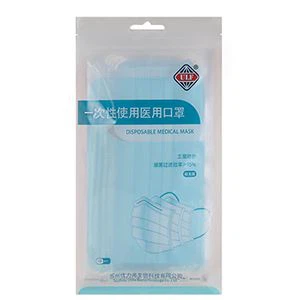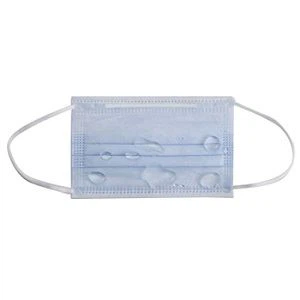Q: What are disposable face masks primarily used for?
A: Disposable face masks are designed to provide a barrier against the transmission of respiratory droplets, which may contain viruses, bacteria, or other harmful particles. They are commonly used in healthcare settings to protect both patients and medical staff from the spread of infections. During outbreaks of respiratory illnesses like influenza or COVID-19, they are also widely used by the general public to help reduce the risk of disease transmission.
Q: How do disposable face masks work to protect the wearer?
A: The primary mechanism of protection in disposable face masks is the physical barrier they create. The masks are typically made from non-woven fabric layers that can filter out pathogens, preventing them from reaching the wearer's airways. The multiple layers within the mask trap particles, and the seal created around the nose and mouth helps minimize the leakage of respiratory droplets.
Q: What materials are disposable face masks made from?
A: Disposable face masks are commonly made from a combination of non-woven fabrics, such as polypropylene, which is known for its lightweight, breathable, and antistatic properties. The melt-blown layer within the mask acts as the filter, while the outer and inner layers provide structural support and absorb moisture.
Q: Are disposable face masks reusable?
A: No, disposable face masks are not reusable. They are designed for single-use only. After each use, or if the mask becomes wet, soiled, or damaged, it should be properly disposed of to prevent contamination. Reusing a disposable mask compromises its effectiveness and can put the wearer at risk of exposure to pathogens.
Q: How often should disposable face masks be replaced?
A: It is recommended to replace disposable face masks after each use or if they become visibly dirty or damaged. If you are in a high-risk environment, such as a healthcare setting, you may need to change your mask more frequently. Always follow local guidelines and recommendations for mask usage.
Q: Can disposable face masks protect against all types of respiratory infections?
A: While disposable face masks offer protection against many respiratory infections, they do not provide complete protection against all pathogens. Their effectiveness depends on factors such as the type of material, fit, and proper usage. N95 respirators, which are designed to fit more tightly and filter out smaller particles, offer a higher level of protection.
Q: What is the difference between disposable face masks and N95 respirators?
A: The main differences between disposable face masks and N95 respirators lie in their design, fit, and filtration efficiency. Disposable face masks are loose-fitting and provide basic protection against large respiratory droplets. N95 respirators, on the other hand, are designed to fit more snugly and filter out at least 95% of airborne particles, including smaller ones. N95 respirators require proper fitting and training to ensure effective use.
Q: Are there any side effects associated with wearing disposable face masks?
A: Wearing a disposable face mask is generally safe for most people. However, some individuals may experience side effects such as skin irritation, difficulty breathing, or fogging of glasses. To minimize these effects, it is important to choose a mask that fits well and is comfortable to wear. If side effects persist, consult a healthcare provider.
Q: How should disposable face masks be stored when not in use?
A: Disposable face masks should be stored in a clean, dry place away from direct sunlight or heat sources. It is best to keep them in a paper bag or container with ventilation holes to prevent moisture accumulation. Avoid storing masks in plastic bags, as this can restrict airflow and promote the growth of microorganisms.
Q: What is the proper way to dispose of a used disposable face mask?
A: To properly dispose of a used disposable face mask, first remove it carefully, avoiding touching the front of the mask. Then, fold the mask in half with the outside facing inward, and place it in a closed bin designated for medical waste or household trash. Wash your hands immediately after disposal. Do not flush masks down the toilet, as they can contribute to clogs and environmental pollution.
Q: Can disposable face masks be recycled?
A: Disposable face masks are generally not recyclable due to their composition and the contamination they may contain. They should be treated as regular waste and disposed of in accordance with local guidelines. However, some companies are exploring ways to recycle or compost face masks, but widespread recycling programs are still limited.
Q: Are there any regulations governing the manufacture and distribution of disposable face masks?
A: Yes, there are various regulations governing the manufacture and distribution of disposable face masks. These regulations vary by country and region but typically include requirements for material safety, filtration efficiency, labeling, and quality control. In the United States, for example, face masks are regulated by the Food and Drug Administration (FDA). Manufacturers must comply with these regulations to ensure their products are safe and effective for use.
Q: How effective are disposable face masks in preventing the spread of COVID-19?
A: Disposable face masks can help reduce the spread of COVID-19 by providing a barrier against respiratory droplets. However, their effectiveness depends on several factors, including mask fit, proper usage, and compliance with other public health measures such as social distancing and hand hygiene. While face masks are not a substitute for these measures, they are an important part of a comprehensive strategy to mitigate the spread of the virus.
Q: Who should not wear disposable face masks?
A: Individuals who have trouble breathing, are unconscious, incapacitated, or otherwise unable to remove the mask without assistance should not wear disposable face masks. Children under the age of 2 are also generally not recommended to wear masks, as they may have difficulty breathing or could accidentally ingest the mask. Always consult a healthcare provider for guidance on mask usage for specific populations.
Q: Can wearing a disposable face mask cause acne?
A: Yes, wearing a disposable face mask can cause acne or exacerbate existing skin conditions due to friction, moisture, and occlusion of the skin. This condition is sometimes referred to as "maskne." To minimize the risk of developing acne, it is important to choose a mask that fits well, avoid wearing makeup under the mask, and practice good skin care habits such as cleansing and moisturizing regularly.
Q: How do I choose the right size disposable face mask?
A: Choosing the right size disposable face mask is essential for optimal protection and comfort. Measure the distance from the bridge of your nose to the bottom of your chin and the width of your face from ear to ear to determine the appropriate size. Look for masks that are labeled with size information and try on different styles to find the best fit for your face shape and size.
Q: Can disposable face masks be worn with glasses?
A: Yes, disposable face masks can be worn with glasses. However, fogging of glasses can be a common issue due to warm breath escaping from the top of the mask. To minimize fogging, make sure the mask fits snugly around your nose and try tightening the ear loops or using a mask with a nose clip. You can also apply an anti-fogging solution to the lenses of your glasses for added protection.
Q: What is the shelf life of disposable face masks?
A: The shelf life of disposable face masks can vary depending on the manufacturer and storage conditions. Generally, masks that are properly stored in a cool, dry place away from direct sunlight or heat sources can last for months or even years. However, it is always best to check the expiration date or manufacturing guidelines provided by the manufacturer for specific instructions on shelf life and storage.
Q: Can disposable face masks be sterilized for reuse?
A: No, disposable face masks are not designed for sterilization and should not be reused. Sterilization processes such as autoclaving or chemical disinfection can damage the material and compromise the integrity of the mask, reducing its ability to filter out particles effectively. Always follow the disposal instructions provided by the manufacturer and replace your mask as needed.
Q: Are there any alternatives to disposable face masks for protecting against respiratory infections?
A: Yes, there are several alternatives to disposable face masks for protecting against respiratory infections. Cloth masks, for example, can be a sustainable and cost-effective option for source control and personal protection when made according to recommended guidelines. Other alternatives include N95 respirators, which offer a higher level of protection but require proper fitting and training to ensure effective use. It is important to choose the appropriate type of protection based on your individual needs and local guidelines.













